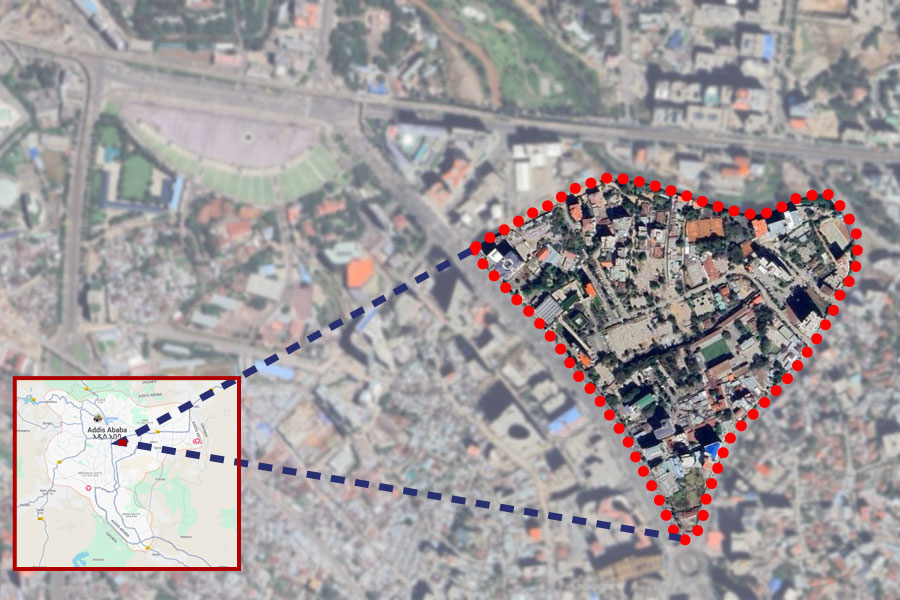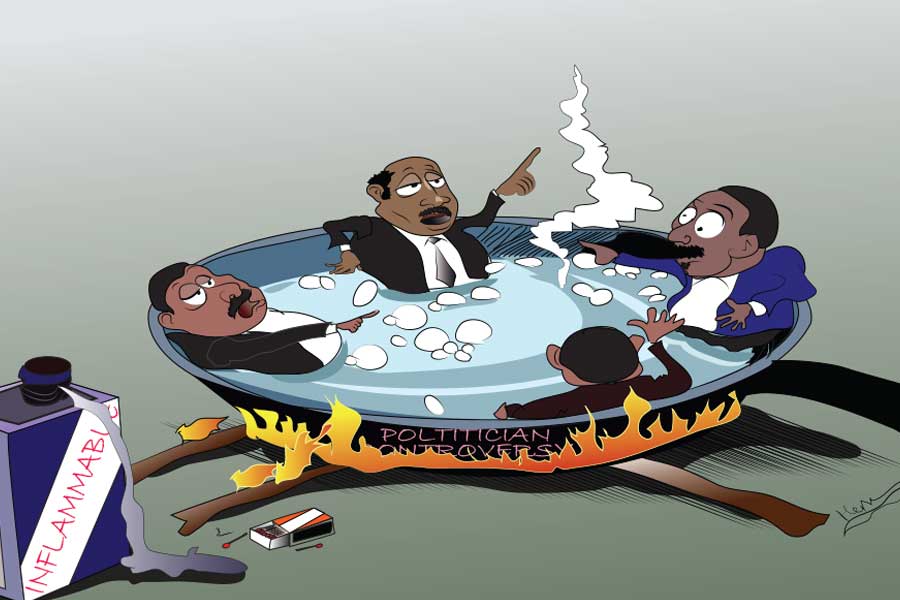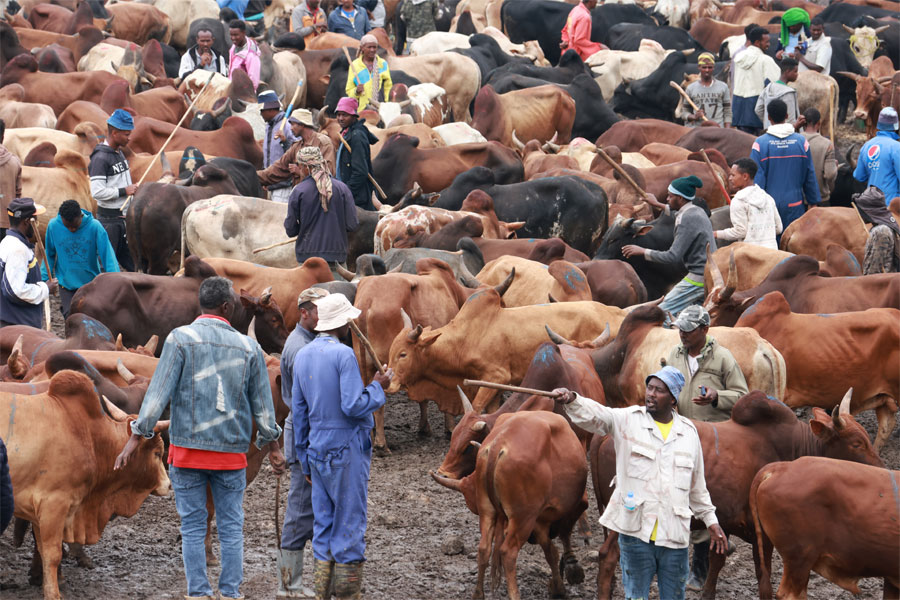
Fortune News | Apr 13,2025
Nov 29 , 2020.
May-Kadra is the latest in a spat of violence committed against civilians across many parts of Ethiopia over the past two years. Located close by the junction of a border with Sudan and Eritrea, it is a dusty town in the far western part of Tigray Regional State where the massacre of 600 civilians was reported this month. Who actually did such a despicable crime after forces of the Federal Defence and Tigray regional government clashed remains unclear, with claims and counterclaims coming out of each side.
Both sides in the armed conflict continued to preach the righteousness of their cause and rested the responsibility for the conflict on their opponent. They both claim victory in the battlefields while remaining mute over the regrettable casualties their respective forces are bound to suffer. After all, this is an armed conflict in which the full forces of military units are deployed - from infantry to air force and mechanised divisions. However, the total communications blackout in the Tigray region has not helped, making it impossible to ascertain many of the claims. It instead created the perfect environment for the truth to become a casualty, as the old adage goes.
It is almost impractical to fault the parties for this, especially once the conflict has begun, and amenable conditions for a ceasefire are not on the table as far as either side is concerned. Truth is a weapon in itself. How it is framed and utilised is part of the tactics in the contestation, no less potent from the battlefields. Any strategist would ensure that the revelation of truth is not made to interfere with the objectives of the military operation. Truth can affect strict military norms, betray strategies and impact morale.
As Chris Cleave, a British writer and journalist, once put it, “What was war, after all, but morale in helmets and jeeps?”
This relationship to truth in a time of conflict explains partly why both sides only comment on what is going right in their military operation from their respective perspectives. It is also why the Tigray People’s Liberation Front (TPLF), the governing party in the Tigray Regional State, only admitted the loss of control of towns after the trickle of photos, videos and some independent reporting made it to social and mainstream media.
Still, not all is fair in love and war. Even in the instances where armed conflict is justified - and it rarely is - crimes against humanity are acts with accountability before the international community. This is true both from a moral standpoint as well as established international laws on armed conflict. Already, charges of war crimes have been levelled against each side. From disturbing reports by Amnesty International and the Ethiopian Human Rights Commission to gruesome accounts of refugees in Sudan, it has been established that hundreds of civilians were found brutally murdered in May-Kadra. These are acts that could lead to war crimes.
The preliminary report by the Commission under Daniel Bekele is a harrowing account of a violation of the laws of armed conflict: attacks against a civilian population not taking part in hostilities. The perpetrators are alleged to be forces loyal to the TPLF, according to witness accounts gathered by the Commission. The leadership of the TPLF nonetheless has denied responsibility. Media reports based on the accounts of refugees that have fled to Sudan attribute these acts of violence to militias attached to Amhara Regional State. Where the truth lies is impossible to pinpoint without an international investigation.
Armed conflict is ugly; directed against civilians, it is uglier still. Investigating them is critical for any healing or political settlement to take place in the aftermath.
Having incensed the public, who are rightly outraged, it requires a thorough investigation. The Commission’s report in highlighting the details of the atrocity committed is encouraging, and a follow-up investigation by the African Commission on Human & Peoples’ Rights to be carried out, even more so.
Also of importance is the allegation by the federal government of an attack against disarmed members of the Northern Command, at the start of the conflict, by the forces of the TPLF. Prime Minister Abiy Ahmed (PhD) charged that in the town of Shiraro, in the Northwestern part of the region, the TPLF "massacred" unarmed members of the National Defence Forces. If proven, this too would be another violation of the law of armed conflict, which prohibits attacks against combatants that are unarmed or no longer possess the ability to engage in battle. This would qualify in the case of the alleged killing in Shiraro, given that they were found with their hands and legs tied to muffle movement, according to the Prime Minister.
Those who are responsible should be prosecuted to the full extent of the law.
A fact-finding mission composed of members that command a certain level of credibility due to their impartiality and expertise, which are usually international rights institutions, should be deployed and provided with access to verify these claims. The world is calling out both sides to cooperate in allowing access to a team of an international investigation, a call neither side should not frustrate if it believes truth is with their side. The call for "an independent and impartial inquiry commission to investigate" is one of the 15 resolutions motioned on Thursday before the European Parliament.
Denying access to international scrutiny in the guise of a sovereign right would be against international norms and the Constitutive Act of the African Union Article 4 (h) Ethiopia signed.
No less worrying, there have also been charges made against the federal government in its military operation, including indiscriminate bombings that led to the loss of civilian life and the denial of humanitarian access in the region. The latter should not be a point for contention. A region that requires imports of food and fuel to meet demand would be hard-pressed to avoid a humanitarian crisis if left to its devices without transportation lines open.
It is incumbent upon the federal government to provide access for humanitarian aid to pass through, including in areas under the control of forces of the TPLF. It is a message the international community has rightly been consistent in stressing, including the European Union (EU).
“International Humanitarian Law needs to be upheld," Josep Borrell, high representative of the EU, said after his meeting with Deputy Prime Minister Demeke Mekonnen. "On behalf of the EU, I have called for safe and free movement and protection of civilians, vulnerable groups and IDPs.”
It is just as critical that indiscriminate attacks are avoided. It is indeed against international law of armed conflict to “render certain points, areas or military forces immune from military operations” by utilising the presence of civilian populations if this is indeed what the TPLF leaders are aiming to do. This is a law against human shields, and indeed becomes a worrying prospect as federal troops advance on the most densely populated eastern parts of the Tigray region, such as Meqelle, the seat of the Tigray Regional State administration.
In the same token, the federal government’s response could be indiscriminate if it employs tactics that will make it impossible to discriminate against military targets from a civilian population. The allegation that the TPLF leadership is using civilians in Tigray as human shields, even if true, does not give it free rein to respond in a manner that inflicts heavy casualities on the civilian population. Here, the principle of non-reciprocity comes into play.
Humanitarian law is to be respected under all circumstances, even when it is believed that the other side is acting irresponsibly in its treatment of the lives of the people in the areas it occupies. The obligation to minimise and discriminate falls on the shoulders of the party that takes the shot as well as the opponent that is using human shields.
“Great care will be given to protect innocent civilians from harm,” Prime Minister Abiy Ahmed (PhD) said in a statement announcing the launch of what he said would be the final phase of the military operation. “All precautions will be taken to ensure that heritage sites, places of worship, public facilities, development institutions and residential areas will not be targets.”
History will hold him up to his words in the developments that are yet to come.
For now though, the world is urging both sides to cease active conflict. But the viable response is through dialogue and mediation.
"Political solution and the search for dialogue are the only viable option for the future of Ethiopia," according to Janez Lenarcic, the EU's commissioner for Crisis Managment.
PUBLISHED ON
Nov 29,2020 [ VOL
21 , NO
1074]

Fortune News | Apr 13,2025

Sunday with Eden | Jul 23,2022

Radar | Feb 05,2022

Radar | Dec 10,2022

Fortune News | Nov 20,2021

Commentaries | Jul 02,2022

Addis Fortune | Nov 04,2020

Editorial | Oct 05,2019

Agenda | Sep 09,2023

Fortune News | Dec 19,2020

My Opinion | 131970 Views | Aug 14,2021

My Opinion | 128359 Views | Aug 21,2021

My Opinion | 126297 Views | Sep 10,2021

My Opinion | 123912 Views | Aug 07,2021

Dec 22 , 2024 . By TIZITA SHEWAFERAW
Charged with transforming colossal state-owned enterprises into modern and competitiv...

Aug 18 , 2024 . By AKSAH ITALO
Although predictable Yonas Zerihun's job in the ride-hailing service is not immune to...

Jul 28 , 2024 . By TIZITA SHEWAFERAW
Unhabitual, perhaps too many, Samuel Gebreyohannes, 38, used to occasionally enjoy a couple of beers at breakfast. However, he recently swit...

Jul 13 , 2024 . By AKSAH ITALO
Investors who rely on tractors, trucks, and field vehicles for commuting, transporting commodities, and f...

Jul 6 , 2025 . By BEZAWIT HULUAGER
The federal legislature gave Prime Minister Abiy Ahmed (PhD) what he wanted: a 1.9 tr...

Jul 6 , 2025 . By YITBAREK GETACHEW
In a city rising skyward at breakneck speed, a reckoning has arrived. Authorities in...

Jul 6 , 2025 . By NAHOM AYELE
A landmark directive from the Ministry of Finance signals a paradigm shift in the cou...

Jul 6 , 2025 . By NAHOM AYELE
Awash Bank has announced plans to establish a dedicated investment banking subsidiary...